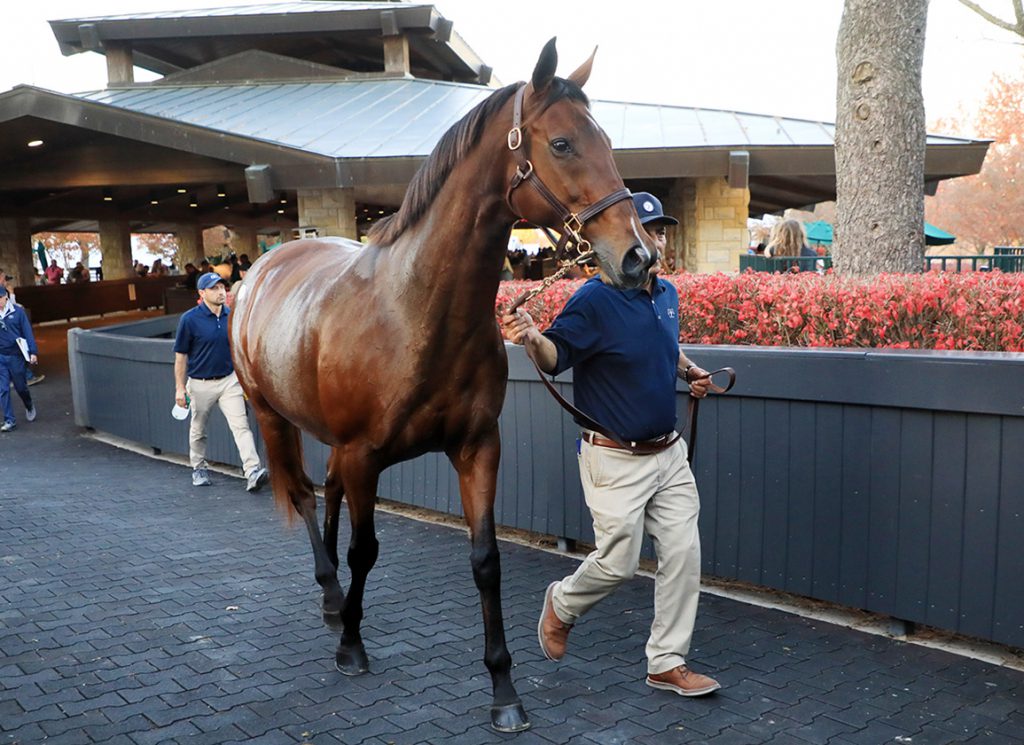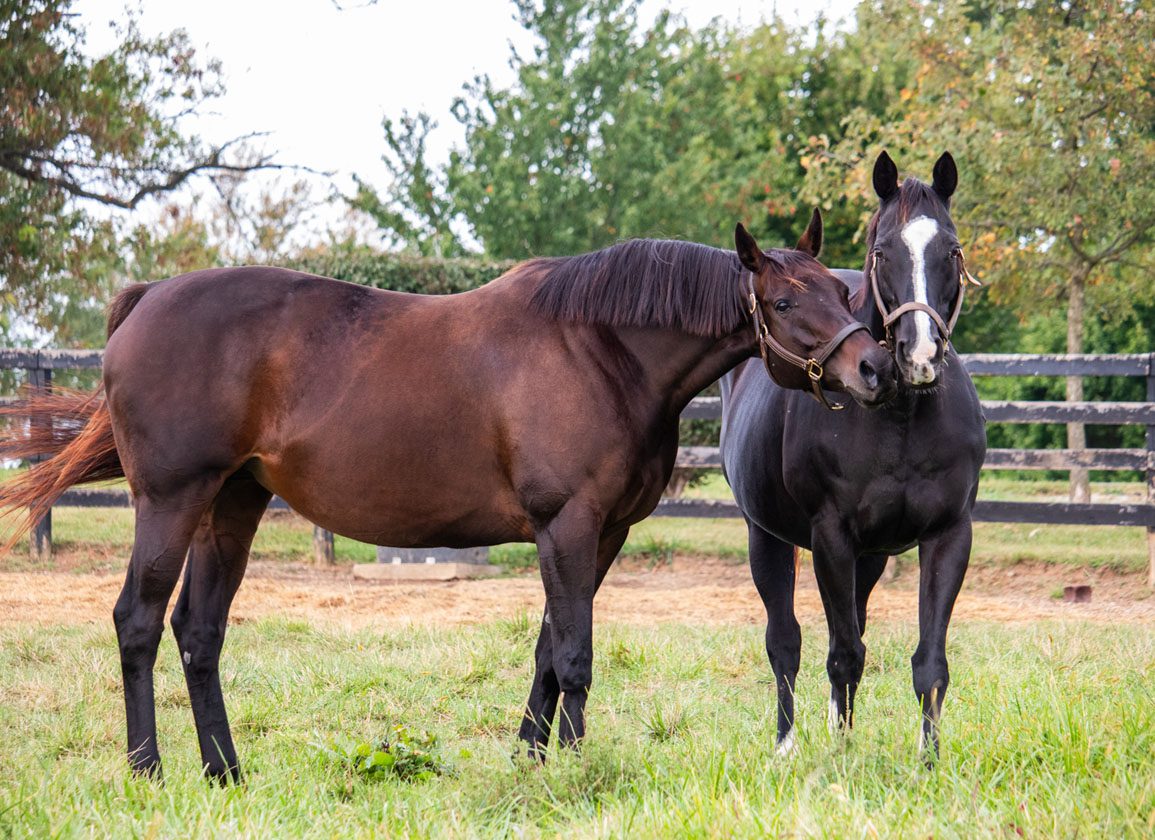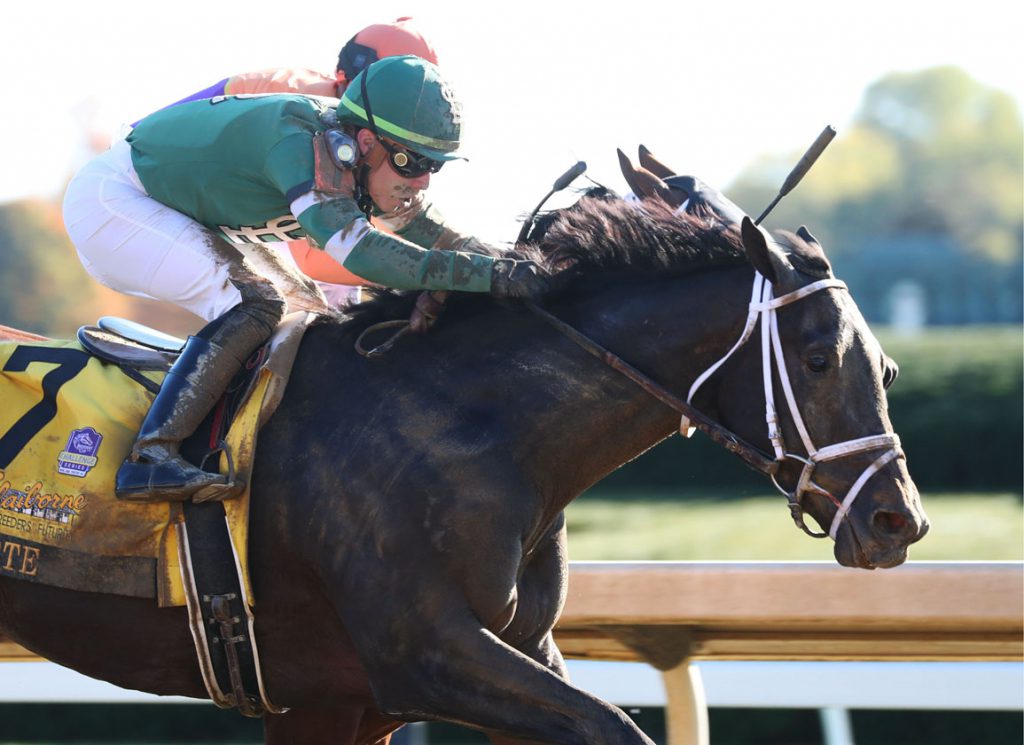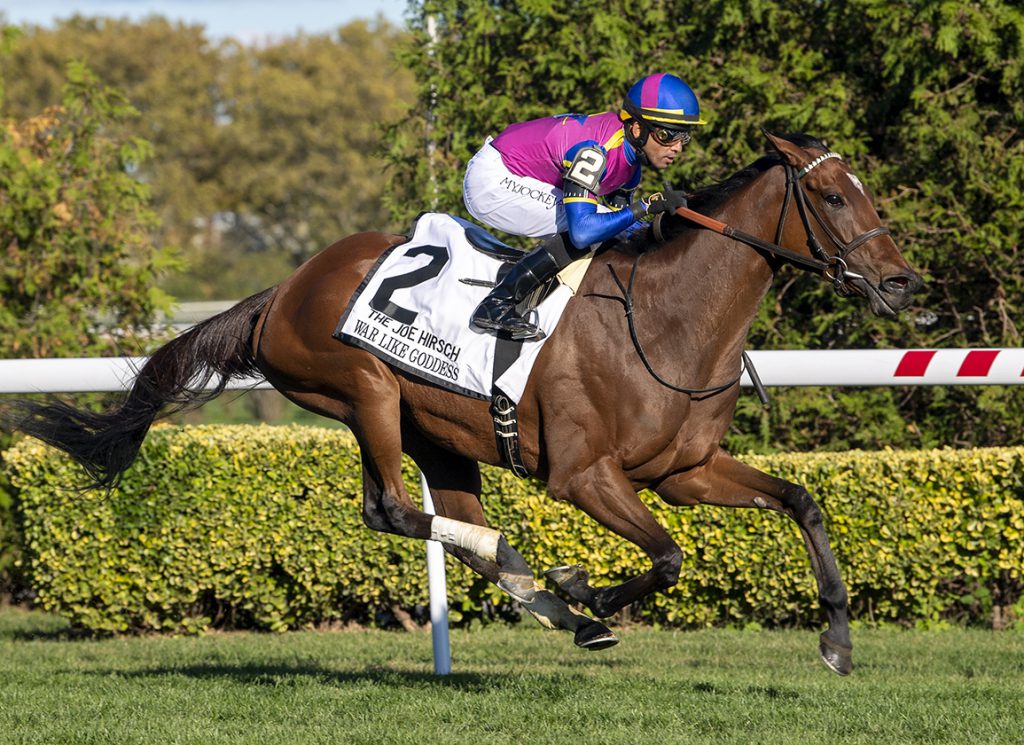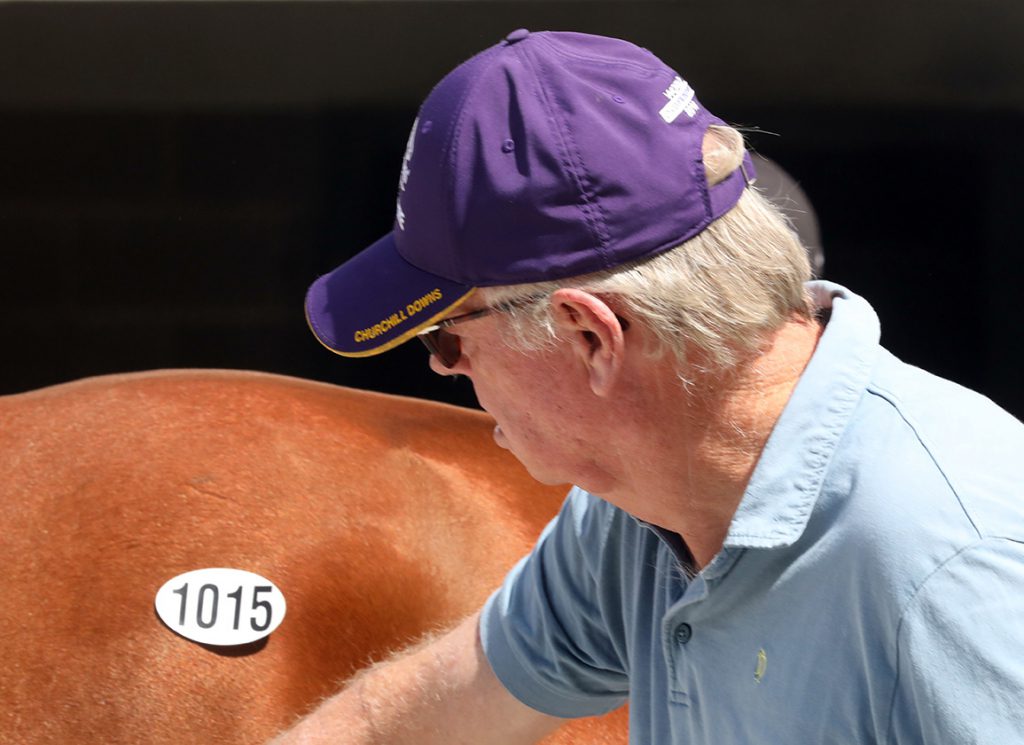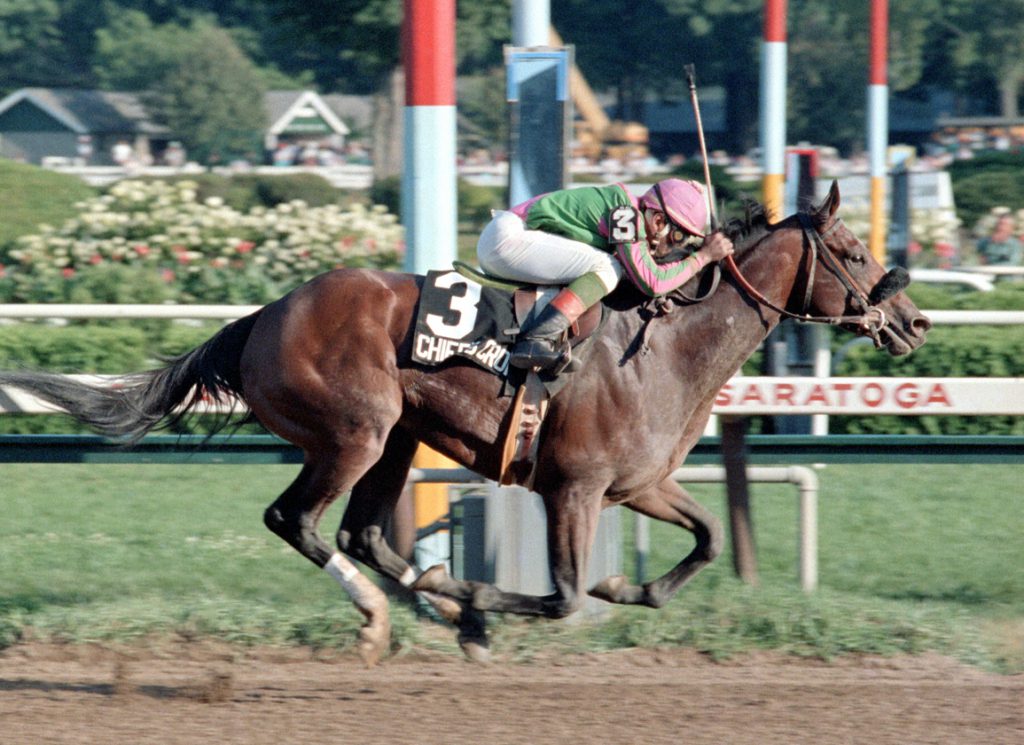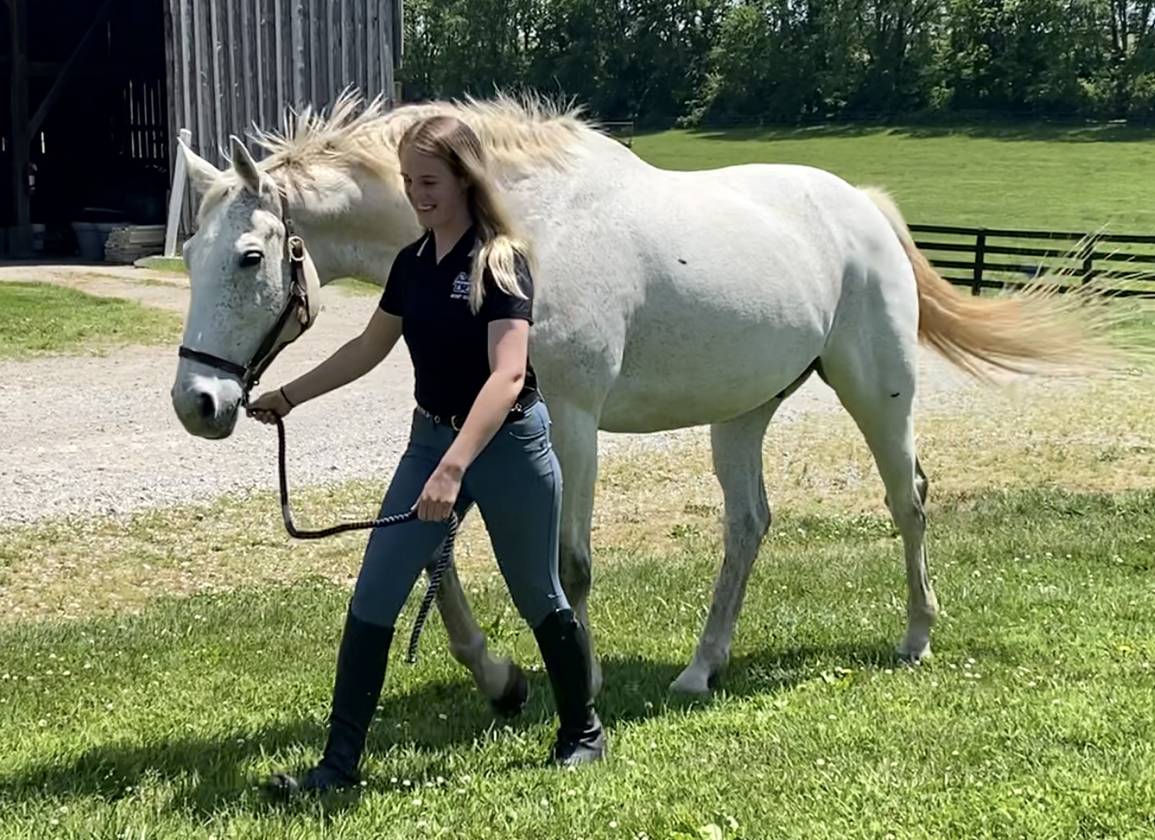by Jessica Martini & Christina Bossinakis
LEXINGTON, KY – The Keeneland November Breeding Stock Sale gained momentum throughout its opening session and concluded a day of competitive bidding Wednesday evening with 11 seven-figure mares and a median up 30% from its 2022 counterpart.
“It was a good day. It was a really good day,” said Keeneland President Shannon Arvin. “We were really pleased with the session overall. The theme of the century seems to be that the quality sells and there was really high demand for the quality. There was great international participation, but plenty of domestic participation as well. There was a real diversity among the buyers. It was a very, very strong market.”
During Wednesday's session, 120 horses grossed $54,340,000. The average of $452,833 was down 8% from the corresponding 2022 session, which included a $4.6-million fractional interest in champion Flightline. The median of $375,000 was up 29.31% from a year ago.
White Hot (Ire) (Galileo {Ire}) was the day's top seller in the ring, when BBA Ireland's Michael Donohoe bid $2.1 million for the dam of Pizza Bianca (Fastnet Rock {Aus}), but the session had a post-sale topper when Puca (Big Brown), carrying a full-sibling to GI Kentucky Derby winner Mage (Good Magic), was purchased by John Stewart for $2.9 million after initially being led out of the ring unsold. The mare capped a busy couple of days for Stewart, who also purchased a colt by Curlin for $600,000 Wednesday, as well as seven horses Tuesday at Fasig-Tipton for $13,350,000.
WHITE HOT (IRE) goes for $2.1 million at #KeeNov! The dam of Pizza Bianca sells in foal to Into Mischief, she was consigned by @stonefarmky and purchased by @BBAIreland. pic.twitter.com/6Oun8mwzeR
— Keeneland Sales (@keenelandsales) November 8, 2023
“There is a lot of confidence in the breeding industry right now,” said Keeneland Vice President of Sales Tony Lacy. “I think the median jumping just over 30% when you include Puca, is a significant increase.”
Shadwell Racing, which purchased the co-topping weanling at Fasig-Tipton Tuesday, purchased Wednesday's highest-priced foal when going to $750,000 for a colt by Gun Runner (hip 154) from the Taylor Made Sales Agency consignment. The colt was the top of a particularly vibrant weanling market Wednesday.
Last year's November Book 1 section had six weanlings sell for $400,000 or more. Twelve hit that mark Wednesday.
“The foal market was especially strong, we thought today,” said Arvin. “We had double the number of foals this year sell for $400,000 or more than last.”
With 65 horses reported not sold, Wednesday's buy-back rate was 35.14%. It was 26.49% a year ago.
“There was some protectionism in the market,” said Lacy. “A lot of people were setting reserves that were not letting horses go. They were not going to sell them short. There were quality mares not being sold off cheap which I think is great for the industry. When you speak to the sellers, they were comfortable that they were not going to sell this one below a certain value. And that's ok.”
The Keeneland November sale continues through Nov. 16 with sessions beginning daily at 10 a.m.
Mage's Dam Puca Brings $2.9M
Plenty of the pre-sale hype revolved around Case Clay Thoroughbred Management's initial sales offering, including the big mare–Puca (Big Brown) (Hip 191)–dam of this season's GI Kentucky Derby winner Mage (Good Magic). Initially led out of the ring unsold at $2.8 million, the 11-year-old mare later found a home with Lexington financier John Stewart, who snapped the mare up for $2.9 million.
Clay sold the mare on behalf of Robert Clay's Grandview Equine, who purchased her in foal to Gun Runner for $475,000 at the Fasig-Tipton November Sale in 2018.
“What we were fine with, RNAing her, was that Good Magic Baby in her belly,” Clay explained. “We were confident in her value, and fortunately, John Stewart recognized that.”
Puca, a half-sister to Grade I winner and $1.5-million earner Finnegans Wake (Powerscourt {GB}), is also responsible for multiple stakes placed Gunning (Gun Runner) and Dornoch, a full-brother to Mage. Runner up in the Sapling S. at Monmouth this past summer, he came back to graduate impressively going a mile and a sixteenth at Keeneland Oct. 14. To further bolster her resume, Puca's yearling colt by McKinzie also realized $1.2 million at the Keeneland September Sale.
“He's buying a queen,” Clay said of Puca. “She is the dam of Derby winner and black-type for the first three foals. If Dornoch wins the [Dec. 2] GII Remsen S. [at Aqueduct], she's 'Broodmare of the Year'.”
The daughter of SP Boat's Ghost (Silver Ghost) sold carrying a full-sibling to the Derby hero.
Clay underscored, “I really think that's her fair market value. Dams of Kentucky Derby winners don't come along in the same year. It's been a long time since that has happened.”
Later in the sale, Clay also sold the second half of his maiden consignment–Dalika (Ger) (Pastorius {Ger})–to Bryant Prentice's Pursuit of Success for $1.65 million.
“I am really grateful to both Paul Varga [owner of Dalika] and Grandview for giving me the opportunity to sell them. And for Bryant Prentice who purchased Dalika and John Stewart for buying Puca. I am excited for them too. I think they bought beautiful mares.”–@CbossTDN
White Hot in Demand at Keeneland
After bloodstock agent Michael Donohoe of BBA Ireland, bidding on behalf of an undisclosed client, got outbid on GI Breeders' Cup Juvenile Fillies Turf winner Pizza Bianca (Fastnet Rock {Aus}) at Fasig-Tipton Tuesday night, he went to $2.1 million to acquire that filly's dam, White Hot (Ire) (Galileo {Ire}) (hip 170) Wednesday at Keeneland.
“She is a Galileo mare and she's the dam of a Group 1-winning juvenile,” Donohoe said of the 10-year-old mare who sold in foal to Into Mischief. “She is in foal to a champion stallion. So she made a lot of sense. It's a great family and those Galileo mares, you can see what they can do around the world as broodmare sires. We are happy to get her.”
#KeenelandNovember: WHITE HOT (Galileo), dam of Pizza Bianca, sells for $2.1 million to @BBAIreland's Michael Donohoe. Consigned by @stonefarmky! pic.twitter.com/CS4xV2b7AE
— TDN (@theTDN) November 8, 2023
White Hot was consigned by Stone Farm on behalf of Bobby Flay, who purchased the mare as a yearling for 1,250,000gns at the 2014 Tattersalls October sale. While the bay never made it to the races, her first foal was Pizza Bianca, who sold for $3 million Tuesday night.
“Pizza Bianca made all of that money last night at Fasig-Tipton,” Donohoe said. “We had a good go at her last night.”
Out of Gwynn (Ire) (Darshaan {GB}), White Hot is a half-sister to G1 Epsom Derby winner Pour Moi (Montjeu {Ire}).
“I bought her for an existing client and she will probably stay in the States and foal here,” Donohoe said.
Of a potential mating in 2024, Donohoe said, “We will see what kind of baby comes out of her. But those Galileo mares, you can cover them to most of the stallions based here in the States.”
While Donohoe declined to name his client, the Irishman has previously bought several high-profile fillies and mares for Yuesheng Zhang's Yulong.
Lynn Hancock of Stone Farm said it was a good result from both sides of the transaction.
“Obviously, great sale, but she's a lovely mare,” Hancock said. “She's beautiful, looks the part. Her first foal is a Breeders' Cup champion. So, you can't ask any more of a mare than that. We're happy with that.”
Of the price, Hancock added, “I think she's worth every penny of it. She's a lovely mare, she's beautiful. She acted like a queen in the back ring and she is in foal to a hot sire.” @JessMartiniTDN
Juddmonte Strikes Late for Ack Naughty
After getting shut out on a number of high-profile mares at Fasig-Tipton Tuesday and earlier in the first session of the Keeneland November session, Juddmonte Farm's Garrett O'Rourke finally got his mare when acquiring Ack Naughty (Afleet Alex) (hip 246) for $1.8 million. The 11-year-old mare, who sold in foal to Into Mischief, was consigned by Sequel New York as agent for Chester and Mary Broman. She is the dam of ill-fated Grade I winner Practical Move (Practical Joke).
Juddmonte goes to $1.8 million for ACK NAUGHTY, dam of Grade 1 winner Practical Move from the @sequelnewyork consignment! #KeeNov pic.twitter.com/8uEhLQ3TEi
— Keeneland Sales (@keenelandsales) November 9, 2023
“We were at the sales yesterday and we were here again today for Puca,” said O'Rourke. “This felt like the last legitimate big, good-looking mare. Obviously, she is the dam of a Grade I winner and she's in foal to Into Mischief, who is a stallion we have had a lot of success with and we breed to every year. There is the opportunity to keep on doing the same mating if the family would want to do that. We are happy with her. She's my type of mare–a nice, big, strong mare with great bone, a good race mare and a good producer already. So I'm glad we got something.”
O'Rourke admitted it's been tough bidding, both at Newtown Paddocks Tuesday and Wednesday at Keeneland.
“It's been hard in there,” he said. “The top end, as everyone says, is just killer strong. It's just like people are buying art in a hot market. It's hard to put a value on them at this level. If you want them, you've got to pay for them. And we weren't able to get there earlier today. This was our last chance and I'm delighted to have something to bring home to add to the Juddmonte broodmare band.”
The Bromans purchased Ack Naughty, in foal to Upstart, for $500,000 at this year's Keeneland January sale. That was just a month after her first foal to race, Practical Move, won the GII Los Alamitos Futurity. The colt added wins in the GII San Felipe S. and GI Santa Anita Derby this past spring.
“We just bought this mare in January,” said Sequel's Becky Thomas. “But it was before Practical Move really became Practical Move. So he won a Grade II and then a Grade I after we bought her. Mr. Broman still races quite a bit, but he is breeding to sell in a commercial market. This will be a chance to put cash back into the program and that's what we did.”
Of the mare's price tag Wednesday, Thomas added, “Way above the reserve, but she's a beautiful mare and she had Practical Move. We are just really happy that we were able to do it and happy that Mr. Broman gives us the ability to play at a high level.”
Frankel Filly for Lyon
Graded stakes winner Skims (GB) (Frankel {GB}) (hip 125) became the first seven-figure mare of the Keeneland November sale when selling for $1.8 million to Jane Lyon's Summer Wind Farm.
“I am very excited about getting this mare,” Lyon said. “I am a Frankel lover. I had one filly [by him] that unfortunately isn't going to be a race filly that I bred. But when I saw this filly, with her race record, I was so excited to have her in my broodmare band.”
#KeenelandNovember: GII winner SKIMS (Frankel) sells for $1.8 million to Jane Lyon's Summer Wind Farm. Consigned by Bluegrass Thoroughbred Services! pic.twitter.com/tsgLzmwVDS
— TDN (@theTDN) November 8, 2023
Bred and raced by Andrew Rosen and trained by Shug McGaughey, Skims won last year's GII Sands Point S. and was second in this year's GII Canadian S. On the board in eight of 14 starts, she won four times and earned $426,685.
The 4-year-old racing or broodmare prospect, who was consigned by Bluegrass Thoroughbred Services, is out of Royal Decree (Street Cry {Ire}) and is a half-sister to group winner War Decree (War Front). Her second dam is multiple Grade I winner Ticker Tape (GB) (Royal Applause {GB}).
“That was right in line with what we thought she would bring,” said Bluegrass Thoroughbred Services' John Stuart. “She is by Frankel and from a nice family. I am really happy that she is staying right here in the Bluegrass.”
'Pursuit' Lands Dalika for $1.65M
Bryant Prentice's Pursuit of Success may not have made the leader board with raw numbers, but it certainly did when it came to quality. With Archie St. George handling the bidding duties, Prentice extended to $1.65 million for Grade I winner Dalika (Ger) (Pastorius {Ger}) (Hip 223) during Keeneland's Book 1 session.
“I was thinking she might not bring that much, but the market is strong and she is a Grade I winner,” said St. George. “It was definitely more than we were hoping to have to give.”
#KeenelandNovember: GI winner DALIKA (Pastorius), in foal to Flightline, leaves the ring after selling for $1.65 million to Pursuit of Success/Bryan Prentice. Consigned by @caseclay1! pic.twitter.com/PE9EWYhNVU
— TDN (@theTDN) November 8, 2023
Consigned by Case Clay Thoroughbred Management, the gray mare sold in foal to Flightline.
Clay said, “I thought it was great and was well sold and well bought. She's sound, a Grade I winner and in foal to Flightline, so I think it's a fair value for her.”
The mare is a member of the first group of mares to be bred to the 2022 Horse of the Year.
“She is a beautiful mare. We were keen to get her,” said St. George. “Obviously, in foal to a beautiful stallion. She was just a top-quality mare.”
Clay added, “[She was] the whole package. She won in 5 1/2 furlongs up to 11 furlongs–very versatile and carried her speed. It was every little thing and then when she arrived here she showed well the whole time. People really liked her, so there was a lot of attention.”
Out of the Hurricane Run (Ire) mare Drawn To Run, the 7-year-old is a half-sister to Group 3 placed Drawn To Dream (Ire) (Iquitos {Ger}). Her extended family includes Group 1 winners Corre Caminos and Recital.
“She is a top race filly,” said St. George. “She has the quality and looks and, hopefully, she can throw something that looks like her. The sky is the limit.”
While at the forefront of Wednesday's purchase for Prentice, St. George was quick to credit the late bloodstock James Delahooke for much of the team's success.
“Mr. James Delahooke used to do a lot of work for [the Prentices] and I am carrying on his legacy,” he said. “It's really a team effort. The mare is on the farm.”
“Taking on James's legacy, it takes an army to do it. God rest his soul.” —@CbossTDN
Dalika Departure Bittersweet for Varga
Paul Varga of Bal Mar Equine found himself in the unprecedented position of experiencing the joy of reeling in seven figures for his prized mare Dalika, but also facing the sad reality of her departure.
“She definitely gave us a great day,” he said. “But it really is hard obviously to let go of a mare like that.”
Grade 1 winner in foal to Flightline, DALIKA (GER), sells for $1.6 million from the @caseclay1 consignment, bought by Pursuit of Success LLC! #KeeNov pic.twitter.com/MWXpvn24ou
— Keeneland Sales (@keenelandsales) November 9, 2023
Bred by Gestut Ammerland, Dalika made three starts in Europe, including a win at Dresden in 2018, before selling privately to Varga late in her 2-year-old season.
For Varga and trainer Al Stall, the German bred annexed four wins at the graded level in the U.S., headed by a score in the 2022 GI Beverly D. S. before retiring with earnings in excess of $1.4 million
In regard to the final price, he added, “Given the results of her accomplishments, that's sort of where we thought she might be.”
While bittersweet, Varga explained the bright side was that he retains Drawn to Race (Ger), a full-sister to the Grade I winner.
“One great thing is I have her full-sister. She's in foal, so I can still keep the family. A huge amount of congratulations to not only Case [Clay] for selling her, but also to Albert Stall, who trained her all along. She required a ton of patience to run that much over that long a time. And he and his group did a super job. Honestly, this was great, but it's so much more fun to watch them win on the racetrack.” —@CbossTDN
Repole Back in Action at Keeneland
Mike Repole, who spent $6 million to buy out his partners on champion Nest (Curlin) at the Fasig-Tipton November sale Tuesday, was back in action at Keeneland Wednesday, purchasing five mares for $4.4 million. Leading the way was the racing/broodmare prospect Interstatedaydream (Classic Empire) (hip 201), who sold for $1.4 million.
“Nice, nice, nice horse,” Repole said of the 4-year-old Ontario-bred who was consigned by Four Star Sales. “I thought she was worth that as a broodmare. We are going to race her next year. I am trying to save racing one horse at a time. Thought about keeping her with Brad Cox.”
The hits keep coming at #KeeNov! Interstatedaydream, recent stakes winner by Classic Empire sold for $1.4 million from the @FourStarSales consignment, purchased by @Westbloodstock for @RepoleStable. pic.twitter.com/UzBgf4pU8A
— Keeneland Sales (@keenelandsales) November 9, 2023
Interstatedaydream, who was purchased by Staton Flurry's Flurry Racing Stable for $175,000 at the 2021 OBS April sale, won last year's GII Black-Eyed Susan S. and GIII Indiana Oaks and was third in the GI Ashland S. She came into the Keeneland sale off wins in the Sept. 30 Twixt S. and Nov. 3 Turnback the Alarm S.
The bay filly is out of Babcock (Uncle Mo), a half-sister to Canadian champion Uncaptured (Lion Heart).
Repole, who said Tuesday he expects to return Nest to the races in 2024, also plans to send Surprisingly (Mastery) (hip 140) back to the track after purchasing the 4-year-old filly for an even $1 million Wednesday from the Claiborne Farm consignment. Bred and campaigned by the Phipps family, the filly won the GIII Endeavor S. in February for trainer Shug McGaughey before hitting the board in four straight graded events through the summer. She was most recently seventh in the GII Ballston Spa S. in August at Saratoga.
“I have a lot of respect for the Phippses,” Repole said. “I have been partners with them on other horses. Plus, I like that she can race. We will keep her here for about 30 days and then ship out to Palm Beach to Todd [Pletcher] and have some fun with her last year. And then put her in our broodmare band.”
Surprisingly is out of Vagabond (Arch), a half-sister to graded winner Great Island (Scat Daddy). Her third dam is Matlacha Pass (Seeking the Gold), who produced MGISWs Point of Entry and Pine Island.
“I get excited about the mares we are buying to race,” Repole said. “[My associates] are getting excited about the mares we are buying in foal. But I like running and I enjoy the races. If we can keep horses around at ages four and five, they can become stars and be more durable.”
Champagne Lady to Barronstown Stud
Stakes-placed Champagne Lady (Uncle Mo) (hip 214) has a pending date with Triple Crown winner Justify after selling for $1.45 million to the bid of the David and Diane Nagle's Barronstown Stud. The 6-year-old mare, who sold in foal to champion Flightline, was consigned by Lane's End. She is out of Grazie Mille (Bernardini) and is a full-sister to Grade I winner Mo Town and a half-sister to stakes-winning and multiple graded placed 'TDN Rising Star' Justique (Justify).
CHAMPAGNE LADY hammers at $1.45 million, the Uncle Mo mare in foal to Flightline was consigned by @LanesEndFarms and purchased by Barronstown Stud at #KeeNov pic.twitter.com/dcsTCIsifv
— Keeneland Sales (@keenelandsales) November 9, 2023
“We loved Champagne Lady's pedigree and we bought her to go to Justify,” said Diane Nagle. “She's a gorgeous mare. Fingers crossed.”
Don Adam's Courtlandt Farms purchased Champagne Lady for $875,000 at the 2018 Keeneland September sale. She was third in the 2022 My Charmer S.
Spendthrift Back in Action at Keeneland
On the heels of an active day of buying the preceding day, Spendthrift Farm was back at it during Keeneland's Book 1 session. The operation's purchases were led by the $1.05-million buy Tarabi (First Samurai) (Hip 142), offered by Lane's End Farm.
“She is a really impressive physical and a well-bred filly, so we are really excited to have her,” said Spendthrift's Ned Toffey. “It was about what we thought we would have to pay. It was a fair price for her. She would be a nice addition to the broodmare band.”
The hammer falls at $1.05 million for Grade 1 placed TARABI! Consigned by @LanesEndFarms, and purchased by @spendthriftfarm at #KeeNov pic.twitter.com/nRZlTcuGft
— Keeneland Sales (@keenelandsales) November 8, 2023
A stakes winner and twice Grade I placed on the track, the chestnut is out of Indian Bay (Indian Charlie), also responsible for full-sibling Shivaji, a group stakes winner and Group 1 placed in Japan.
Asked about who might be first up as a possible mate for the 4-year-old mare, Toffey said, “We have a couple of options there. Maybe something on the farm, or maybe we'll take her off the farm. We'll figure it out.”
At Fasig-Tipton Tuesday, Spendthrift secured five mares for $7.7 million, headed by the $3-million purchase of GI Kentucky Oaks heroine Secret Oath (Arrogate).
“A couple of years ago we bought a number of really strong mares,” said Toffey, explaining the nursery's spending over the two days. “We always continue to try to upgrade the broodmare band. The old adage: pad at the top, and carve from the bottom. That's us just trying to do that. This is part of our process.” —@CbossTDN
Technical Analysis to Japan
Technical Analysis (Ire) (Kingman {GB}) (hip 145), consigned by Elite, will eventually be heading to the Far East after selling for $1 million Wednesday at Keeneland. Bloodstock agent Keisuke Onishi of J S Company made the winning bid on behalf of an undisclosed Japanese client.
“She was a very good race horse and was quite a good mover,” said Onishi. “The owner may keep her here to breed her in the U.S. or he may send her straight to Japan.”
Consigned by @EliteRaceSales and purchased by J.S. Company, multiple graded stakes winner TECHNICAL ANALYSIS (IRE) sells for $1 million at #KeeNov! pic.twitter.com/SfM1voaUNK
— Keeneland Sales (@keenelandsales) November 8, 2023
Technical Analysis, purchased for 200,000gns at the 2019 Tattersalls October sale, was a four-time graded stakes winner for Klaravich Stables and trainer Chad Brown, with victories in the 2022 GII Ballston Spa S. and 2021 GII Lake Placid S. The 5-year-old mare capped her racing career with a win in the Oct. 27 Athenia S.
The mare's trip through the sales ring Wednesday added to an impressive roster of sales for Seth Klarman's Klaravich Stables, which also sold Grade I winner Search Results (Flatter) to Katsumi Yoshida for $3.6 million and stakes winner Strong Incentive (Warrior's Reward) for $2,150,000 to Alpha Delta Stables at Fasig-Tipton Tuesday.
The Japanese buyers, who were such a strong presence at Fasig-Tipton, continued to be active across town Wednesday despite the weakness of the yen to the dollar.
“The currency situation is not that good for us, but I think the Japanese buyers still have to be active and try to find good pedigrees and horses to import to Japan,” said Onishi.
AAA Active from Fasig to Keeneland
Randy Hartley and Dean DeRenzo's weanling-to-yearling pinhooking partnership AAA Thoroughbreds, which enjoyed seven-figure success at last year's Fasig-Tipton Saratoga sale, has been busy buying foals, both at Newtown Paddocks Tuesday and at Keeneland Wednesday. The group purchased a colt by Gun Runner (hip 51) for $470,000 and a colt by Justify (hip 67) for $450,000 Tuesday.
At Keeneland Wednesday, AAA Thoroughbreds purchased four weanlings, led by a daughter of Curlin (hip 151) consigned by Denali Stud for $550,000. The foal is out of multiple graded winner Tin Type Gal (Tapit), who is a daughter of Grade I winner Miss Shop (Deputy Minister).
“She's a Curlin filly with a big pedigree,” Hartley said of the chestnut's appeal. “It's so hard to buy Curlins, so we felt like any one that we can get our hands on, we are going to try to buy. I felt like this filly, with the pedigree, she had the whole package. It's a lot of money, but to get a Curlin, if you like them, you're going to have to pay for them.”
The AAA Thoroughbreds partnership also acquired a colt from the first crop of Grade I winner Yaupon (Uncle Mo) (hip 37) for $400,000 from the Taylor Made Sales Agency consignment. The weanling is out of graded winner Lady Sabelia (Majestic Warrior).
“I thought he was the best Yaupon on the ground,” Hartley said. “My goal was to come here and try to buy the best one.”
Hartley said he had plenty of faith in the young stallion, who stands for $25,000 at Spendthrift Farm.
“And my friend Hoby Kight bought [Yaupon] as a yearling, so I was around him when he worked :20 and change at Gulfstream,” Hartley said. “He was such a beautiful horse. And then he went off and won those graded races. We just felt like he could be a big up-and-coming stallion for us. We searched over there [at Fasig] and over here and he was the best one we saw.”
Yaupon worked a quarter in :20 3/5 before RNA'ing for $485,000 at the 2019 Fasig-Tipton Gulfstream sale. He returned to sell for $255,000 to Corinne and Bill Heiligbrodt at the OBS June sale and went on to win the 2021 GI Forego S.
Yaupon was also represented in the Keeneland sales ring Wednesday by a filly (hip 5) who sold for $400,000 to Haruya Yoshida.
Asked about paying $400,000 for a pinhooking prospect by a first-crop sire, Hartley said, “$400,000 is the new number if you like a baby now. You used to be able to come here and buy these for $200,000 or $250,000, but those $200,000 babies are $400,000 now. If you want them, you've just got to buy them.” @JessMartiniTDN
Justify Colt Brings $525K On Day 1
Midway through Wednesday's Book 1 session, a weanling colt by Justify, Hip 150, realized $525,000 from Michelle St. George, signing as Teddy Town Thoroughbreds from the back of the sales pavilion. Consigned by Vinery Sales, the Feb. 27 foal is out of Peruvian Group 3 winner and Group 1-placed Thundering Emilia (Thunder Gulch).
“Everything about him was desirable,” said St. George. “He was a beautiful horse. The stallion is also on top of the world right now. We are very happy to have him.”
According to St. George, also the wife of Archie St. George, the colt was purchased as a pinhook prospect.
“We have been very fortunate this year,” she said when asked about the year in the ring thus far. “Some of them were pinhooks and others, homebreds. But we did have a good year. When you have the right stallions and the right pedigree, it helps.”
The colt's 17-year-old dam is also responsible for Peruvian Group 1 scorer Emilia's Moon (Malibu Moon), SP Mighty Scarlett (Scat Daddy) and Helium (Ironicus), winner of the GII Tampa Bay Derby.
The St. Georges also purchased Hip 138, a filly by Charlatan, for $280,000 earlier in the session. Consigned by Taylor Made Sales selling on behalf of the dispersal of White Fox Farm, the chestnut is out of GSW Summersault (Rock Hard Ten).
According to St. George, the operation aims to secure up to about 20 weanlings throughout the season, but admits that they typically aren't at the price point of Wednesday's purchase.
“You have to do this [buy at the upper level] unfortunately. It's hard, but it's kind of what we're up against now. But this is the one we wanted for today, and we are delighted to have him.” —@CbossTDN
The post Diverse Buying Bench Powers Electric Keeneland November Opener appeared first on TDN | Thoroughbred Daily News | Horse Racing News, Results and Video | Thoroughbred Breeding and Auctions.
